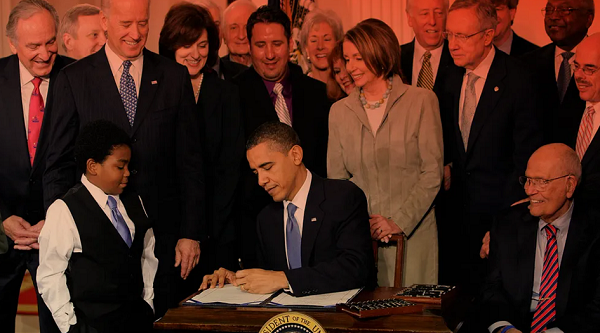Obamacare Created Big Medicine
By The Lever
January 29, 2024
 The dominant trend of US social life over the last fifteen years is a stagnating, and then declining, life span. There are many reasons for this trend, such as violence, diet, suicide, drug addiction, and auto accidents. But for many reasons, our monopolistic health care system is a big part of the problem.
The dominant trend of US social life over the last fifteen years is a stagnating, and then declining, life span. There are many reasons for this trend, such as violence, diet, suicide, drug addiction, and auto accidents. But for many reasons, our monopolistic health care system is a big part of the problem.
Monopolistic drug wholesalers fostered the opioid crisis, and now, for the same reason, they are creating shortages of prescription drugs. Untreated mental illness is a significant factor in elevated suicide rates. Not being able to get care when you need it is associated with higher levels of death and permanent injury. More fundamentally, knowing that there are no systems in place to protect or care for you undermines any sense of hope.
It’s easy to describe what is happening as consistent with an overall pessimistic tale about the U.S., one that is almost uniquely American. The story goes that in the U.S., the richest country in the world, citizens can’t get access to a doctor when they need it. Most of Europe, and most countries globally, have universal health care, and some have had it for more than a century. By contrast, we’ve never had it here.
America almost achieved universal health care multiple times. Teddy Roosevelt proposed it, so did Harry Truman, Richard Nixon, Jimmy Carter, and Bill Clinton. They failed, largely because of the powerful doctor lobby — the American Medical Association — standing against it.
But if you look at the story from the perspective of most Americans instead of the system at large, the story is not so rigid. For much of the 20th century, the American health care system was one of very high quality, with great doctors, hospitals, and an exceptionally innovative, if overpriced, pharmaceutical system.
And access generally did increase, quite dramatically. We organized our health care system by letting people collectively get together, pool their money, and use this pool to pay for medical care when any member needed it. From 1950 to 1965, the percentage of Americans with surgical coverage jumped from 36 percent to 72 percent. In the 1960s, as historian Alan Derickson noted, “health insecurity became the exception rather than the rule.”
These pools are known as insurance companies, and today they represent the classic dilemma of using ‘other people’s money’ that Brandeis noted in the early 20th century. Even so, health insurance is very good to have. And in 2010, the uninsured population in the U.S. was 45 million, or 15 percent of the country. That’s too many.
While there has also been frustration that insurers don’t cover what they should, trying to penny pinch, and costing lives in the process, for most Americans, the assumption was that the care is pretty good. And it often was. So access, not quality, is the fulcrum for political debate, along with some critiques of health insurers who refused to fully cover necessary services.
Yet over the last twenty years, something fundamental in the American health care system has changed. It’s not that people can’t get insurance; indeed, America is more insured than it has ever been. It’s that the underlying quality inside the health system is falling apart. One obvious signpost, of course, is that doctors, distributors, and pharmaceutical companies helped hook Americans on heroin-style substances from the late 1990s onward, leading to the deaths of hundreds of thousands of people. But it’s more than that scandal, as gruesome as it is.
Americans spend more on care, and get less, than any other country. And the reason for the dysfunctional care is that since the passage of Obamacare, the firms who control our health care system have become far bigger, and much more powerful.
The hospital sector, for instance, represents a third of health care spending. Starting in the 1980s and accelerating after Obamacare, hospital systems have merged into giant monopolies, driving huge price hikes and increasingly poor quality. Private equity has come into everything from ambulances to urgent care to nursing homes. Monopolistic Group Purchasing Organizations have created shortages among hundreds of drugs, which reduce the equality of care. These are known problems, and real.
[READ FULL ARTICLE HERE]
